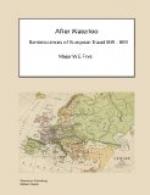* * * * *
Remarks on the various dramatic performances which I witnessed at Paris, with opinions on the French theatre in general.
In my ideas of dramatic works I am neither rigidly classic nor romantic, and I think both styles may be good if properly managed and the interest well kept up; in a word I am pleased with all genres hors le genre ennuyux,[43] and tho’ a great admirer of Shakespeare and Schiller, I am equally so of Voltaire, Racine and Corneille; I take equal delight in the pathos of the sentimental dramas of Kotzebue as in the admirable satire and vis comica of the unrivalled Moliere, so that on my arrival at Paris I was not violently prejudiced either for or against the French stage, but rather pre-occupied, to use a gentler term, in its favour; and I have not been at all disappointed, for I think I can pronounce it with safety the first, perhaps the only stage in Europe.
I now mean to speak not of Operas, nor of Operas-comiques, nor of melodrames, nor of vaudevilles; all these have their respective merits; but when I speak of the French stage, I confine myself to the regular theatre of tragedy and comedy, of their classical pieces; in a word, to the dramatic performances usually given at the Theatre Francais.
The first piece I saw performed was Manlius;[44] but I was too far off from the stage to judge of the acting, and could do little more than catch the sounds. The parterre and the whole house was full. I was in the fourth tier of boxes, yet I could distinguish at intervals the finest and most prominent traits, of Talma’s acting, particularly in that scene where he upbraids his friend with having betrayed him. This he gave with uncommon energy and effect. The plot of this piece is very similar to that of Venice preserved.[45]
The next piece I saw represented was the Avare of Moliere, which to me was one of the greatest dramatic treats I had ever witnessed. Every part was well supported. The next was Athalie of Racine. Here too I was highly gratified. Mlle Georges performed the part of Athalie and gave me the perfect ideal of the haughty Queen. Her narration of the dream was given with the happiest effect, and in her attempt to conceal her uneasiness and her affected contempt of the dream in these lines:




